1 Samuel 4 meaning explained in AI Summary
This chapter recounts the devastating defeat of the Israelites by the Philistines, marking a low point in their history and highlighting the consequences of their sin and disregard for God.
The Battle and the Ark:
- The Israelites, already at war with the Philistines, suffer a heavy defeat in battle, losing 4,000 men (verses 1-2).
- Blaming their defeat on the absence of God's presence, the elders decide to bring the Ark of the Covenant, a symbol of God's covenant and power, from Shiloh to the battlefield (verses 3-4).
- The arrival of the Ark is met with great enthusiasm and confidence from the Israelites, but the Philistines are terrified, recognizing it as the symbol of the God who had devastated Egypt in the past (verses 5-9).
Defeat and Loss:
- Despite the presence of the Ark, the Israelites suffer a crushing defeat at the hands of the Philistines, losing 30,000 men, including Hophni and Phinehas, the two sons of Eli the priest (verses 10-11).
- The Ark of the Covenant is captured by the Philistines, marking a significant spiritual defeat for Israel (verse 11).
The News Reaches Shiloh:
- A messenger, having torn his clothes and put dust on his head in mourning, arrives in Shiloh and delivers the devastating news of the defeat, the death of Eli's sons, and the capture of the Ark (verses 12-17).
- Upon hearing that the Ark of God had been captured, Eli, who was old and weak, falls backward from his seat, breaks his neck, and dies (verses 18).
- Eli's daughter-in-law, Phinehas' wife, who was pregnant, goes into labor upon hearing the news. She gives birth to a son but dies in childbirth, naming the child Ichabod, meaning "The glory has departed from Israel," in recognition of the tragic loss of God's presence (verses 19-22).
Key Themes:
- The consequences of sin and disobedience: The Israelites' defeat is presented as a consequence of their wickedness and their turning away from God.
- The danger of presumption: The Israelites wrongly assumed that the mere presence of the Ark would guarantee victory, failing to understand that true victory comes from obedience to God.
- The sovereignty of God: Despite the tragic events, God remains sovereign and uses even defeat to accomplish his purposes.
This chapter serves as a stark reminder that God's presence and blessing cannot be taken for granted and that true victory comes from a right relationship with Him, not from outward rituals or symbols.
1 Samuel 4 bible study ai commentary
The central theme of 1 Samuel 4 is the devastating consequences of treating God presumptuously. It demonstrates that God’s presence and power cannot be manipulated by religious formalism or symbols, like the Ark of the Covenant. Through a catastrophic military defeat, the capture of the Ark, and the death of its priestly line, the chapter reveals that God's glory will abandon those who substitute superstitious ritual for genuine repentance and obedience, thereby finalizing the judgment on Eli's house and setting the stage for a new spiritual order in Israel.
1 Samuel 4 context
The events occur during the late period of the Judges, a time of national anarchy and moral decay (Judg 21:25). Israel existed as a loose tribal confederation under constant threat from the technologically superior Philistines, who controlled iron production. Spiritually, the nation was corrupt, reflected in the priesthood at Shiloh under Eli, whose sons Hophni and Phinehas were known for their profane behavior. This chapter narrates the tragic culmination of this spiritual corruption, where Israel disastrously misuses the Ark of the Covenant, the sacred chest symbolizing God’s throne and presence, treating it not as a holy object of worship but as a magical totem for military victory.
1 Samuel 4:1-2
Now Israel went out to battle against the Philistines. They encamped at Ebenezer, and the Philistines encamped at Aphek. The Philistines drew up in line against Israel, and when the battle spread, Israel was defeated by the Philistines, who killed about four thousand men on the field of battle.
In-depth-analysis
- Verse 1a, "And the word of Samuel came to all Israel," serves as a bridge from chapter 3, establishing Samuel as God's authenticated prophet. However, the nation immediately ignores this new source of divine guidance and acts on its own initiative.
- Going to Battle: There is no indication that Israel consulted the LORD or His new prophet, Samuel, before initiating this war. This reflects the spiritual arrogance and self-reliance typical of the period of the Judges.
- Ebenezer: The name, meaning "stone of help," is likely an editorial insertion looking ahead to 1 Samuel 7:12, when Samuel names the place after a victory achieved through repentance. Its inclusion here creates a powerful literary irony: the place later known as the "stone of help" is first the site of a crushing defeat due to a lack of reliance on God.
- Initial Defeat: The loss of four thousand men was a significant but not catastrophic defeat. It was a divine "wake-up call" intended to lead Israel to introspection and repentance. Their response in the next verse shows they failed the test.
Bible references
- Joshua 7:4-5: "...the men of Ai killed about thirty-six of their men... And the hearts of the people melted and became as water." (A prior instance of defeat due to hidden sin in the camp).
- Judges 21:25: "In those days there was no king in Israel. Everyone did what was right in his own eyes." (Describes the spiritual climate leading to such presumptive actions).
- 1 Samuel 7:12: "Then Samuel took a stone... and called its name Ebenezer; for he said, ‘Till now the LORD has helped us.’" (The fulfillment of the name after genuine repentance and God-given victory).
Cross references
Josh 7:7-9 (Joshua's response to defeat vs elders'); Psa 44:9-10 (Lamenting defeat when God doesn't go out with armies); Deut 28:25 (Curse for disobedience is defeat before enemies).
1 Samuel 4:3
And when the people came to the camp, the elders of Israel said, “Why has the LORD defeated us today before the Philistines? Let us bring the ark of the covenant of the LORD here from Shiloh, that it may come among us and save us from the hand of our enemies.”
In-depth-analysis
- "Why has the LORD defeated us?": They correctly identify God as the agent of their defeat but fail to ask the right follow-up question: "What sin have we committed?" Instead of looking inward in repentance, they look outward for a quick fix.
- "Let us bring the ark": This reveals a profoundly pagan and superstitious mindset. They seek to manipulate God's power by co-opting a sacred object. They want the Ark's presence, not God's will.
- "that it may come... and save us": They attribute saving power to the object itself ("it"), effectively treating the Ark as an idol or a talisman. This is a direct violation of the principles of their covenant relationship with Yahweh.
Bible references
- Numbers 14:42-45: "Do not go up, for the LORD is not among you... But they presumed to go up... the ark of the covenant of the LORD... did not depart from the camp. Then the Amalekites... struck them down." (A direct parallel of presuming on God's help while the symbol of His presence stayed behind, then acting without His actual presence).
- Jeremiah 7:4: "Do not trust in these deceptive words: ‘This is the temple of the LORD, the temple of the LORD, the temple of the LORD.’" (Jeremiah warns a later generation against the same "superstitious sanctuary" thinking).
- Acts 19:13-16: "...some of the itinerant Jewish exorcists undertook to invoke the name of the Lord Jesus... But the evil spirit answered, 'Jesus I know, and Paul I recognize, but who are you?'" (An example of trying to use a sacred name/power without a genuine relationship).
Cross references
Isa 29:13 (Drawing near with lips, heart is far); Psa 50:16-17 (God rejects the worship of the disobedient); Exd 32:4-5 (Worshipping a physical representation of God).
1 Samuel 4:4
So the people sent to Shiloh, and they brought from there the ark of the covenant of the LORD of hosts, who is enthroned on the cherubim. And the two sons of Eli, Hophni and Phinehas, were there with the ark of the covenant of God.
In-depth-analysis
- "LORD of hosts, who is enthroned on the cherubim": The narrator deliberately uses this full, majestic title to emphasize the sacrilege of their actions. They are summoning the King of the universe as if he were a genie in a box. The cherubim represented God’s sovereign, holy, and unapproachable throne.
- Hophni and Phinehas: Their presence as escorts of the Ark is a crucial detail. As corrupt priests, their association with the Ark profanes it further. Their presence also signals the impending fulfillment of the prophecy against Eli’s house.
Bible references
- 1 Samuel 2:34: "And this that shall come upon your two sons, Hophni and Phinehas, shall be the sign to you: on the same day both of them shall die." (The direct fulfillment of the man of God's prophecy).
- Psalm 99:1: "The LORD reigns; let the peoples tremble! He sits enthroned upon the cherubim; let the earth quake!" (Shows the proper response to God's enthroned presence is awe and fear, not manipulation).
- Exodus 25:22: "There I will meet with you, and from above the mercy seat, from between the two cherubim... I will speak with you..." (Defines the Ark's purpose as the place of divine communication and atonement, not a weapon of war).
Cross references
Num 4:15 (Warning against touching the holy things); Psa 80:1 (Shepherd of Israel, enthroned on cherubim); 2 Sam 6:6-7 (Uzzah's death for improperly touching the Ark).
1 Samuel 4:5-9
As soon as the ark of the covenant of the LORD came into the camp, all Israel gave a mighty shout, so that the earth resounded... And the Philistines were afraid, for they said, “A god has come into the camp.” And they said, “Woe to us! For nothing like this has happened before... Who can deliver us from the power of these mighty gods? These are the gods who struck the Egyptians with every sort of plague in the wilderness.”...
In-depth-analysis
- Israel's Mighty Shout: This is a shout of false confidence and religious hype, not genuine faith. It is noise devoid of spiritual substance.
- Philistine Fear & Theology: The Philistines react with terror. Ironically, their pagan theology gives more accurate honor to God's reputation than Israel's actions do to His person.
- "A god has come": Their polytheistic worldview sees Yahweh as Israel's national deity who has now personally entered the battlefield.
- "These mighty gods": The plural "gods" reflects either a polytheistic understanding or a Hebrew plural of majesty misunderstood.
- "struck the Egyptians": Their historical memory is potent, though slightly inaccurate (the plagues were in Egypt, not the wilderness). This detail heightens the irony: God’s enemies fear His past deeds while His own people have forgotten the character required to be in His presence.
- "Show yourselves men" (v.9): Faced with a divine foe, their response is not to surrender but to fight harder, fearing enslavement to the Israelites.
Polemics
The text is a strong polemic against the Ancient Near Eastern belief that gods were confined to their own territories and that bringing their cultic statue into battle guaranteed the god's participation and victory. The God of Israel shatters this notion; He is sovereign and will not be co-opted for human agendas. His presence is determined by covenant fidelity, not the location of a physical object.
Bible references
- Joshua 6:20: "So the people shouted, and the trumpets were blown... and the wall fell down flat." (A contrast between a divinely-commanded shout of faith and Israel's empty shout here).
- Exodus 14:25: "...the Egyptians said, 'Let us flee from before Israel, for the LORD fights for them against the Egyptians.'" (The Philistines' fear echoes the fear of the original Egyptians).
Cross references
Judg 16:20 (Samson's presumption without God's power); Hos 7:14 (They wail but don't cry to God from the heart).
1 Samuel 4:10-11
So the Philistines fought, and Israel was defeated, and they fled, every man to his tent. And there was a very great slaughter, for there fell of Israel thirty thousand foot soldiers. And the ark of God was captured, and the two sons of Eli, Hophni and Phinehas, died.
In-depth-analysis
- Defeat was Greater: The initial loss was 4,000; the loss with the Ark was 30,000. God demonstrates that religious presumption leads to a far greater disaster than silence.
- The Triple Catastrophe: The verse lists three calamities in climactic order:
- Military Rout: "Israel was defeated."
- Theological Crisis: "The ark of God was captured." This was unthinkable. It seemed to suggest that Yahweh had been defeated by the gods of the Philistines.
- Priestly Judgment: "Hophni and Phinehas, died." The prophecy of 1 Samuel 2:34 is perfectly fulfilled. The corrupt leadership is surgically removed by God's judgment.
Bible references
- Psalm 78:60-61: "He abandoned his dwelling at Shiloh... He delivered his power to captivity, his glory to the hand of the foe." (A poetic reflection on this specific event, interpreting it as God delivering His own glory into enemy hands).
- Lamentations 2:1-2: "How the Lord in his anger has set the daughter of Zion under a cloud!... He has given into the hand of the enemy the walls of her strongholds." (Describes the similar divine abandonment of Jerusalem to Babylon).
- Romans 2:24: "For, as it is written, 'The name of God is blasphemed among the Gentiles because of you.'" (Israel's actions brought dishonor to God's name, the opposite of their intent).
Cross references
1 Sam 2:34 (Prophecy fulfilled); Deut 31:17 (God hides His face when Israel sins); Lev 26:17 (Covenant curse of defeat).
1 Samuel 4:12-18
A man of Benjamin ran from the battle line and came to Shiloh... When he came, Eli was sitting on his seat by the road watching, for his heart trembled for the ark of God... And the man said... "Israel has fled before the Philistines, and there has also been a great slaughter... your two sons also, Hophni and Phinehas, are dead, and the ark of God has been captured.” As soon as he mentioned the ark of God, Eli fell over backward from his seat... and his neck was broken and he died...
In-depth-analysis
- Eli's Trembling: Eli's primary anxiety was not for his sons but "for the ark of God." He knew it should not have been taken to battle. His fear shows a flicker of piety, but it is too late; his failure was in not stopping them.
- Escalating Report: The messenger delivers the news in a devastating sequence, from bad to worse, saving the ultimate blow for last:
- Israel has fled.
- There was a great slaughter.
- Your two sons are dead.
- The ark of God has been captured.
- Eli's Death: Eli survives hearing of the national defeat and even the death of his two sons. It is the news of the captured Ark—the loss of God’s perceived presence and glory—that kills him. This signifies that the core of the tragedy was theological, not just personal or military. His 40-year tenure as judge ends in complete failure.
Bible references
- 1 Samuel 1:9: "...Eli the priest was sitting on the seat by the doorpost of the temple of the LORD." (Shows his characteristic sedentary position, symbolizing his passive leadership).
- 1 Samuel 3:13: "And I declare to him that I am about to punish his house forever, for the iniquity that he knew, because his sons were blaspheming God, and he did not restrain them." (The reason for the judgment that climaxes in his death).
- Hebrews 12:5-6: "My son, do not regard lightly the discipline of the Lord... For the Lord disciplines the one he loves..." (God's judgment on Eli's house is a severe act of divine discipline).
Cross references
2 Sam 1:4 (Report of Saul's death); Prov 16:18 (Pride goes before a fall).
1 Samuel 4:19-22
Now his daughter-in-law, the wife of Phinehas, was pregnant... she gave birth. And... the women who stood by her said to her, “Do not be afraid, for you have borne a son.” But she did not answer or pay any attention. And she named the child Ichabod, saying, “The glory has departed from Israel!” because the ark of God had been captured...
In-depth-analysis
- Phinehas's Wife: In a chapter dominated by the failure of male leaders (elders, priests, Eli), a woman provides the definitive theological interpretation of the events. Her voice becomes prophetic.
- Did not Answer: She completely ignores the good news of a son's birth—the continuation of the family line, normally a cause for great joy. This starkly emphasizes the scale of the spiritual catastrophe; personal and familial concerns are rendered meaningless.
- Ichabod (אִי־כָבוֹד): The name literally means "No glory" or "Where is the glory?". The Hebrew word for glory, kavod (כָּבוֹד), also means "weight" or "honor." The loss of the Ark was the loss of the weight of God's manifest presence among them.
- "The glory has departed": She twice states the reason for the name is the capture of the Ark, cementing it as the chapter's main point. She rightly understood that Israel’s uniqueness was not in its army or priests, but in the glorious presence of God.
Bible references
- Ezekiel 10:18: "Then the glory of the LORD went out from the threshold of the house, and stood over the cherubim." (A direct parallel, where Ezekiel sees God's glory physically departing the Temple before its destruction).
- Hosea 9:12: "Even though they bring up their children, I will bereave them... Woe to them when I depart from them!" (Expresses the core truth that God's departure is the ultimate woe).
- Romans 3:23: "...for all have sinned and fall short of the glory of God." (Connects the universal human condition of sin to this same theme of being separated from God's glory).
Cross references
Gen 35:16-18 (Rachel dies in childbirth naming son of sorrow); Luke 2:25 (Simeon waits for the "consolation of Israel").
1 Samuel chapter 4 analysis
- The Rejection of a True Prophet for a False Hope: The chapter begins with "the word of Samuel" being available but ignored. The people reject God's living prophetic word and instead grasp for a physical object, demonstrating their spiritual blindness.
- God's Sovereignty in Defeat: The supreme irony of the story unfolds in the following chapters (1 Sam 5-6). God allows His Ark to be captured not because He is weak, but to demonstrate His power inside enemy territory, dismantling their idols (Dagon) without any help from Israel's army. His judgment on Israel is simultaneously the prelude to His judgment on the Philistine gods.
- The End of the Shiloh Priesthood: This chapter marks the definitive end of Shiloh as Israel’s spiritual center and the termination of Eli's priestly line from prominence. It paves the way for the rise of Samuel, who combines the roles of prophet, priest, and judge, and eventually for the establishment of the monarchy and the future temple in Jerusalem.
- The Ark is Not a talismen: A central theological lesson of the Bible is that external religious symbols or rites are meaningless without internal realities like faith, repentance, and obedience. God will not allow His name or His symbols to be used as tools for human agendas.
- Prophetic Naming of a child (Ichabod): Just as the names of the Patriarchs in Genesis 5 can be interpreted to form a prophetic sentence ("Man [is] appointed mortal sorrow; [but] the Blessed God shall come down teaching [that] His death shall bring [the] despairing rest"), the naming of Ichabod by his dying mother serves a similar purpose. It is a powerful, concise prophecy that pronounces God's verdict on an entire generation, encapsulating the spiritual state of the nation in a single, tragic word.
1 Samuel 4 summary
Israel, acting with religious superstition instead of faith, takes the Ark of the Covenant into battle against the Philistines. This act of presumption leads to a catastrophic defeat, the death of 30,000 men, the fulfillment of the prophecy against Eli's house with the deaths of Hophni, Phinehas, and Eli himself, and the capture of the Ark. The chapter culminates in the birth of Ichabod, whose name means "the glory has departed," articulating the theological reality that God has withdrawn His manifest presence from a disobedient and manipulative people.
1 Samuel 4 AI Image Audio and Video
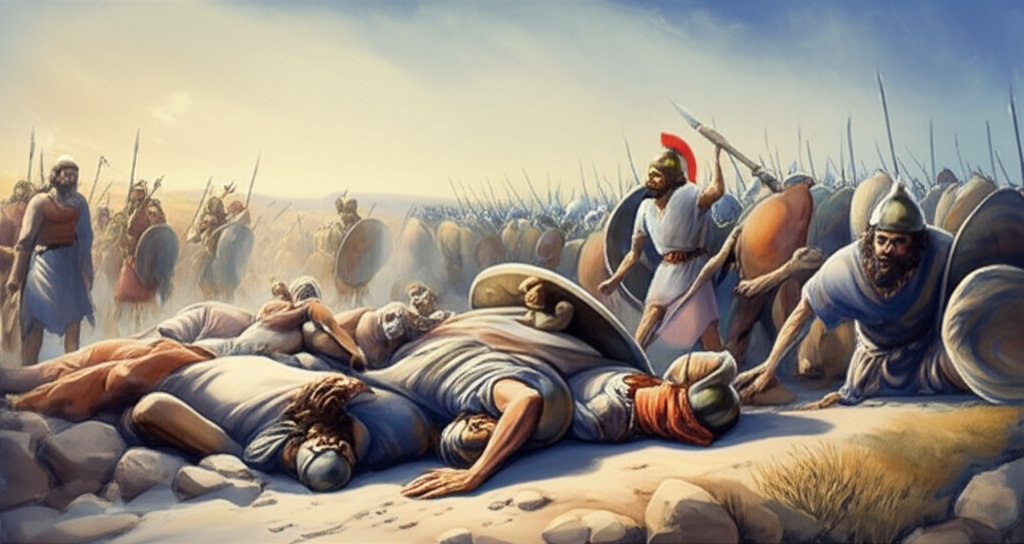
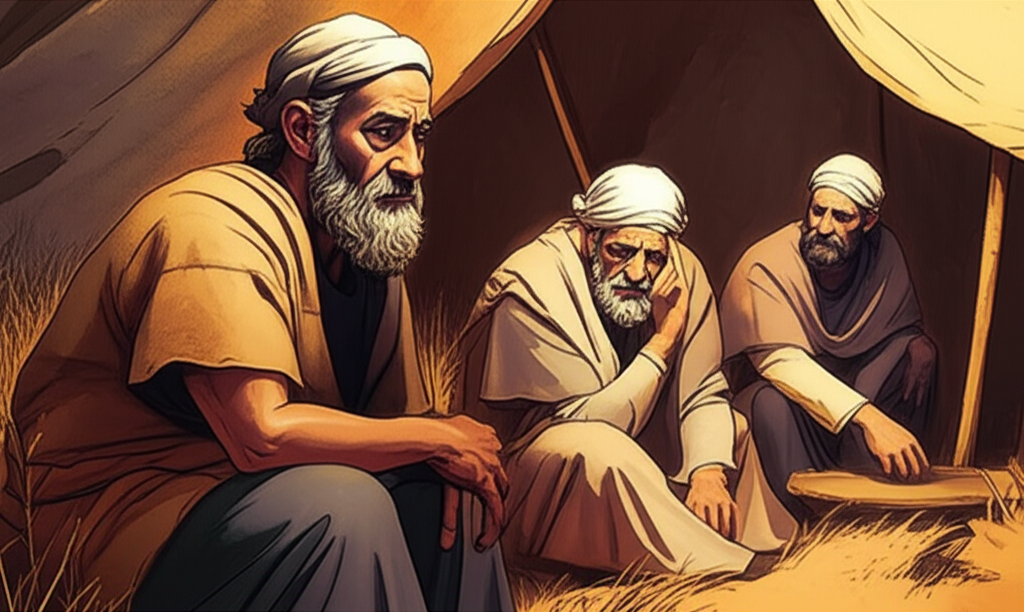
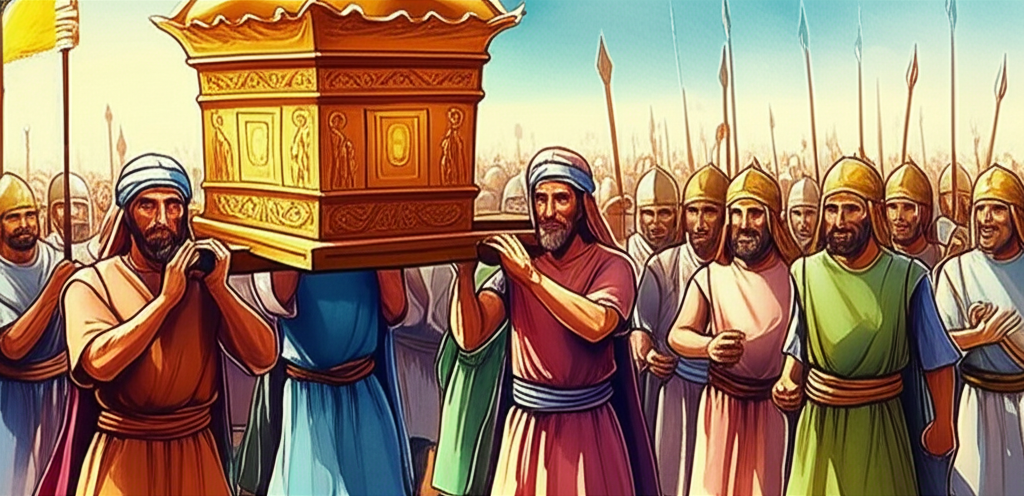
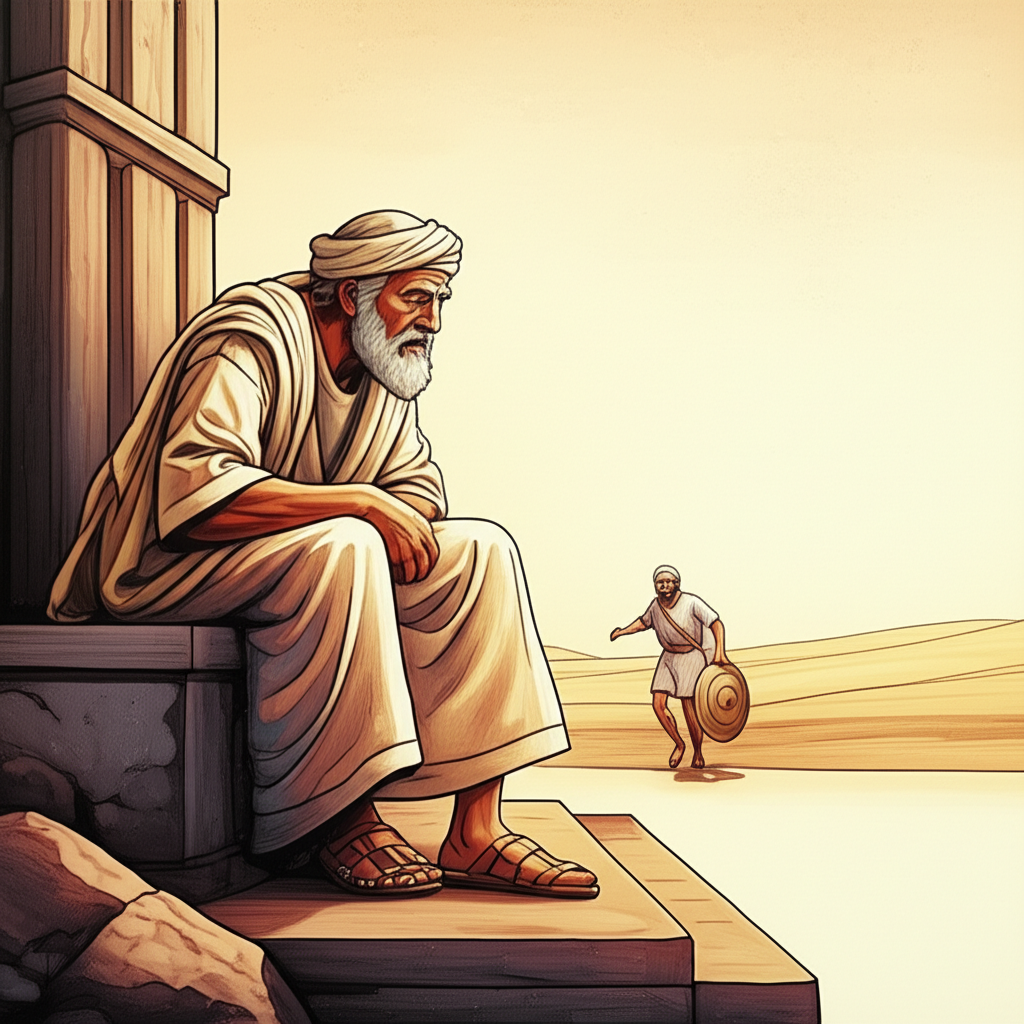




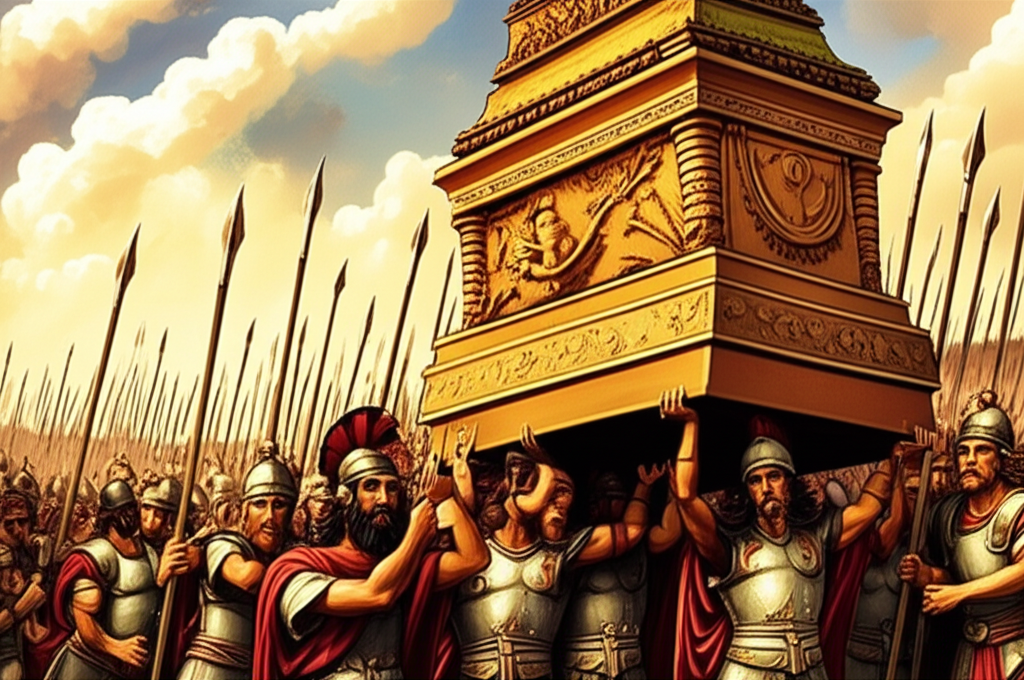
1 Samuel chapter 4 kjv
- 1 And the word of Samuel came to all Israel. Now Israel went out against the Philistines to battle, and pitched beside Ebenezer: and the Philistines pitched in Aphek.
- 2 And the Philistines put themselves in array against Israel: and when they joined battle, Israel was smitten before the Philistines: and they slew of the army in the field about four thousand men.
- 3 And when the people were come into the camp, the elders of Israel said, Wherefore hath the LORD smitten us to day before the Philistines? Let us fetch the ark of the covenant of the LORD out of Shiloh unto us, that, when it cometh among us, it may save us out of the hand of our enemies.
- 4 So the people sent to Shiloh, that they might bring from thence the ark of the covenant of the LORD of hosts, which dwelleth between the cherubim: and the two sons of Eli, Hophni and Phinehas, were there with the ark of the covenant of God.
- 5 And when the ark of the covenant of the LORD came into the camp, all Israel shouted with a great shout, so that the earth rang again.
- 6 And when the Philistines heard the noise of the shout, they said, What meaneth the noise of this great shout in the camp of the Hebrews? And they understood that the ark of the LORD was come into the camp.
- 7 And the Philistines were afraid, for they said, God is come into the camp. And they said, Woe unto us! for there hath not been such a thing heretofore.
- 8 Woe unto us! who shall deliver us out of the hand of these mighty Gods? these are the Gods that smote the Egyptians with all the plagues in the wilderness.
- 9 Be strong and quit yourselves like men, O ye Philistines, that ye be not servants unto the Hebrews, as they have been to you: quit yourselves like men, and fight.
- 10 And the Philistines fought, and Israel was smitten, and they fled every man into his tent: and there was a very great slaughter; for there fell of Israel thirty thousand footmen.
- 11 And the ark of God was taken; and the two sons of Eli, Hophni and Phinehas, were slain.
- 12 And there ran a man of Benjamin out of the army, and came to Shiloh the same day with his clothes rent, and with earth upon his head.
- 13 And when he came, lo, Eli sat upon a seat by the wayside watching: for his heart trembled for the ark of God. And when the man came into the city, and told it, all the city cried out.
- 14 And when Eli heard the noise of the crying, he said, What meaneth the noise of this tumult? And the man came in hastily, and told Eli.
- 15 Now Eli was ninety and eight years old; and his eyes were dim, that he could not see.
- 16 And the man said unto Eli, I am he that came out of the army, and I fled to day out of the army. And he said, What is there done, my son?
- 17 And the messenger answered and said, Israel is fled before the Philistines, and there hath been also a great slaughter among the people, and thy two sons also, Hophni and Phinehas, are dead, and the ark of God is taken.
- 18 And it came to pass, when he made mention of the ark of God, that he fell from off the seat backward by the side of the gate, and his neck brake, and he died: for he was an old man, and heavy. And he had judged Israel forty years.
- 19 And his daughter in law, Phinehas' wife, was with child, near to be delivered: and when she heard the tidings that the ark of God was taken, and that her father in law and her husband were dead, she bowed herself and travailed; for her pains came upon her.
- 20 And about the time of her death the women that stood by her said unto her, Fear not; for thou hast born a son. But she answered not, neither did she regard it.
- 21 And she named the child Ichabod, saying, The glory is departed from Israel: because the ark of God was taken, and because of her father in law and her husband.
- 22 And she said, The glory is departed from Israel: for the ark of God is taken.
1 Samuel chapter 4 nkjv
- 1 And the word of Samuel came to all Israel. Now Israel went out to battle against the Philistines, and encamped beside Ebenezer; and the Philistines encamped in Aphek.
- 2 Then the Philistines put themselves in battle array against Israel. And when they joined battle, Israel was defeated by the Philistines, who killed about four thousand men of the army in the field.
- 3 And when the people had come into the camp, the elders of Israel said, "Why has the LORD defeated us today before the Philistines? Let us bring the ark of the covenant of the LORD from Shiloh to us, that when it comes among us it may save us from the hand of our enemies."
- 4 So the people sent to Shiloh, that they might bring from there the ark of the covenant of the LORD of hosts, who dwells between the cherubim. And the two sons of Eli, Hophni and Phinehas, were there with the ark of the covenant of God.
- 5 And when the ark of the covenant of the LORD came into the camp, all Israel shouted so loudly that the earth shook.
- 6 Now when the Philistines heard the noise of the shout, they said, "What does the sound of this great shout in the camp of the Hebrews mean?" Then they understood that the ark of the LORD had come into the camp.
- 7 So the Philistines were afraid, for they said, "God has come into the camp!" And they said, "Woe to us! For such a thing has never happened before.
- 8 Woe to us! Who will deliver us from the hand of these mighty gods? These are the gods who struck the Egyptians with all the plagues in the wilderness.
- 9 Be strong and conduct yourselves like men, you Philistines, that you do not become servants of the Hebrews, as they have been to you. Conduct yourselves like men, and fight!"
- 10 So the Philistines fought, and Israel was defeated, and every man fled to his tent. There was a very great slaughter, and there fell of Israel thirty thousand foot soldiers.
- 11 Also the ark of God was captured; and the two sons of Eli, Hophni and Phinehas, died.
- 12 Then a man of Benjamin ran from the battle line the same day, and came to Shiloh with his clothes torn and dirt on his head.
- 13 Now when he came, there was Eli, sitting on a seat by the wayside watching, for his heart trembled for the ark of God. And when the man came into the city and told it, all the city cried out.
- 14 When Eli heard the noise of the outcry, he said, "What does the sound of this tumult mean?" And the man came quickly and told Eli.
- 15 Eli was ninety-eight years old, and his eyes were so dim that he could not see.
- 16 Then the man said to Eli, "I am he who came from the battle. And I fled today from the battle line." And he said, "What happened, my son?"
- 17 So the messenger answered and said, "Israel has fled before the Philistines, and there has been a great slaughter among the people. Also your two sons, Hophni and Phinehas, are dead; and the ark of God has been captured."
- 18 Then it happened, when he made mention of the ark of God, that Eli fell off the seat backward by the side of the gate; and his neck was broken and he died, for the man was old and heavy. And he had judged Israel forty years.
- 19 Now his daughter-in-law, Phinehas's wife, was with child, due to be delivered; and when she heard the news that the ark of God was captured, and that her father-in-law and her husband were dead, she bowed herself and gave birth, for her labor pains came upon her.
- 20 And about the time of her death the women who stood by her said to her, "Do not fear, for you have borne a son." But she did not answer, nor did she regard it.
- 21 Then she named the child Ichabod, saying, "The glory has departed from Israel!" because the ark of God had been captured and because of her father-in-law and her husband.
- 22 And she said, "The glory has departed from Israel, for the ark of God has been captured."
1 Samuel chapter 4 niv
- 1 And Samuel's word came to all Israel. Now the Israelites went out to fight against the Philistines. The Israelites camped at Ebenezer, and the Philistines at Aphek.
- 2 The Philistines deployed their forces to meet Israel, and as the battle spread, Israel was defeated by the Philistines, who killed about four thousand of them on the battlefield.
- 3 When the soldiers returned to camp, the elders of Israel asked, "Why did the LORD bring defeat on us today before the Philistines? Let us bring the ark of the LORD's covenant from Shiloh, so that he may go with us and save us from the hand of our enemies."
- 4 So the people sent men to Shiloh, and they brought back the ark of the covenant of the LORD Almighty, who is enthroned between the cherubim. And Eli's two sons, Hophni and Phinehas, were there with the ark of the covenant of God.
- 5 When the ark of the LORD's covenant came into the camp, all Israel raised such a great shout that the ground shook.
- 6 Hearing the uproar, the Philistines asked, "What's all this shouting in the Hebrew camp?" When they learned that the ark of the LORD had come into the camp,
- 7 the Philistines were afraid. "A god has come into the camp," they said. "Oh no! Nothing like this has happened before.
- 8 We're doomed! Who will deliver us from the hand of these mighty gods? They are the gods who struck the Egyptians with all kinds of plagues in the wilderness.
- 9 Be strong, Philistines! Be men, or you will be subject to the Hebrews, as they have been to you. Be men, and fight!"
- 10 So the Philistines fought, and the Israelites were defeated and every man fled to his tent. The slaughter was very great; Israel lost thirty thousand foot soldiers.
- 11 The ark of God was captured, and Eli's two sons, Hophni and Phinehas, died.
- 12 That same day a Benjamite ran from the battle line and went to Shiloh with his clothes torn and dust on his head.
- 13 When he arrived, there was Eli sitting on his chair by the side of the road, watching, because his heart feared for the ark of God. When the man entered the town and told what had happened, the whole town sent up a cry.
- 14 Eli heard the outcry and asked, "What is the meaning of this uproar?" The man hurried over to Eli,
- 15 who was ninety-eight years old and whose eyes had failed so that he could not see.
- 16 He told Eli, "I have just come from the battle line; I fled from it this very day." Eli asked, "What happened, my son?"
- 17 The man who brought the news replied, "Israel fled before the Philistines, and the army has suffered heavy losses. Also your two sons, Hophni and Phinehas, are dead, and the ark of God has been captured."
- 18 When he mentioned the ark of God, Eli fell backward off his chair by the side of the gate. His neck was broken and he died, for he was an old man, and he was heavy. He had led Israel forty years.
- 19 His daughter-in-law, the wife of Phinehas, was pregnant and near the time of delivery. When she heard the news that the ark of God had been captured and that her father-in-law and her husband were dead, she went into labor and gave birth, but was overcome by her labor pains.
- 20 As she was dying, the women attending her said, "Don't despair; you have given birth to a son." But she did not respond or pay any attention.
- 21 She named the boy Ichabod, saying, "The Glory has departed from Israel"?because of the capture of the ark of God and the deaths of her father-in-law and her husband.
- 22 She said, "The Glory has departed from Israel, for the ark of God has been captured."
1 Samuel chapter 4 esv
- 1 And the word of Samuel came to all Israel. Now Israel went out to battle against the Philistines. They encamped at Ebenezer, and the Philistines encamped at Aphek.
- 2 The Philistines drew up in line against Israel, and when the battle spread, Israel was defeated before the Philistines, who killed about four thousand men on the field of battle.
- 3 And when the people came to the camp, the elders of Israel said, "Why has the LORD defeated us today before the Philistines? Let us bring the ark of the covenant of the LORD here from Shiloh, that it may come among us and save us from the power of our enemies."
- 4 So the people sent to Shiloh and brought from there the ark of the covenant of the LORD of hosts, who is enthroned on the cherubim. And the two sons of Eli, Hophni and Phinehas, were there with the ark of the covenant of God.
- 5 As soon as the ark of the covenant of the LORD came into the camp, all Israel gave a mighty shout, so that the earth resounded.
- 6 And when the Philistines heard the noise of the shouting, they said, "What does this great shouting in the camp of the Hebrews mean?" And when they learned that the ark of the LORD had come to the camp,
- 7 the Philistines were afraid, for they said, "A god has come into the camp." And they said, "Woe to us! For nothing like this has happened before.
- 8 Woe to us! Who can deliver us from the power of these mighty gods? These are the gods who struck the Egyptians with every sort of plague in the wilderness.
- 9 Take courage, and be men, O Philistines, lest you become slaves to the Hebrews as they have been to you; be men and fight."
- 10 So the Philistines fought, and Israel was defeated, and they fled, every man to his home. And there was a very great slaughter, for thirty thousand foot soldiers of Israel fell.
- 11 And the ark of God was captured, and the two sons of Eli, Hophni and Phinehas, died.
- 12 A man of Benjamin ran from the battle line and came to Shiloh the same day, with his clothes torn and with dirt on his head.
- 13 When he arrived, Eli was sitting on his seat by the road watching, for his heart trembled for the ark of God. And when the man came into the city and told the news, all the city cried out.
- 14 When Eli heard the sound of the outcry, he said, "What is this uproar?" Then the man hurried and came and told Eli.
- 15 Now Eli was ninety-eight years old and his eyes were set so that he could not see.
- 16 And the man said to Eli, "I am he who has come from the battle; I fled from the battle today." And he said, "How did it go, my son?"
- 17 He who brought the news answered and said, "Israel has fled before the Philistines, and there has also been a great defeat among the people. Your two sons also, Hophni and Phinehas, are dead, and the ark of God has been captured."
- 18 As soon as he mentioned the ark of God, Eli fell over backward from his seat by the side of the gate, and his neck was broken and he died, for the man was old and heavy. He had judged Israel forty years.
- 19 Now his daughter-in-law, the wife of Phinehas, was pregnant, about to give birth. And when she heard the news that the ark of God was captured, and that her father-in-law and her husband were dead, she bowed and gave birth, for her pains came upon her.
- 20 And about the time of her death the women attending her said to her, "Do not be afraid, for you have borne a son." But she did not answer or pay attention.
- 21 And she named the child Ichabod, saying, "The glory has departed from Israel!" because the ark of God had been captured and because of her father-in-law and her husband.
- 22 And she said, "The glory has departed from Israel, for the ark of God has been captured."
1 Samuel chapter 4 nlt
- 1 And Samuel's words went out to all the people of Israel. The Philistines Capture the Ark At that time Israel was at war with the Philistines. The Israelite army was camped near Ebenezer, and the Philistines were at Aphek.
- 2 The Philistines attacked and defeated the army of Israel, killing 4,000 men.
- 3 After the battle was over, the troops retreated to their camp, and the elders of Israel asked, "Why did the LORD allow us to be defeated by the Philistines?" Then they said, "Let's bring the Ark of the Covenant of the LORD from Shiloh. If we carry it into battle with us, it will save us from our enemies."
- 4 So they sent men to Shiloh to bring the Ark of the Covenant of the LORD of Heaven's Armies, who is enthroned between the cherubim. Hophni and Phinehas, the sons of Eli, were also there with the Ark of the Covenant of God.
- 5 When all the Israelites saw the Ark of the Covenant of the LORD coming into the camp, their shout of joy was so loud it made the ground shake!
- 6 "What's going on?" the Philistines asked. "What's all the shouting about in the Hebrew camp?" When they were told it was because the Ark of the LORD had arrived,
- 7 they panicked. "The gods have come into their camp!" they cried. "This is a disaster! We have never had to face anything like this before!
- 8 Help! Who can save us from these mighty gods of Israel? They are the same gods who destroyed the Egyptians with plagues when Israel was in the wilderness.
- 9 Fight as never before, Philistines! If you don't, we will become the Hebrews' slaves just as they have been ours! Stand up like men and fight!"
- 10 So the Philistines fought desperately, and Israel was defeated again. The slaughter was great; 30,000 Israelite soldiers died that day. The survivors turned and fled to their tents.
- 11 The Ark of God was captured, and Hophni and Phinehas, the two sons of Eli, were killed.
- 12 A man from the tribe of Benjamin ran from the battlefield and arrived at Shiloh later that same day. He had torn his clothes and put dust on his head to show his grief.
- 13 Eli was waiting beside the road to hear the news of the battle, for his heart trembled for the safety of the Ark of God. When the messenger arrived and told what had happened, an outcry resounded throughout the town.
- 14 "What is all the noise about?" Eli asked. The messenger rushed over to Eli,
- 15 who was ninety-eight years old and blind.
- 16 He said to Eli, "I have just come from the battlefield ? I was there this very day." "What happened, my son?" Eli demanded.
- 17 "Israel has been defeated by the Philistines," the messenger replied. "The people have been slaughtered, and your two sons, Hophni and Phinehas, were also killed. And the Ark of God has been captured."
- 18 When the messenger mentioned what had happened to the Ark of God, Eli fell backward from his seat beside the gate. He broke his neck and died, for he was old and overweight. He had been Israel's judge for forty years.
- 19 Eli's daughter-in-law, the wife of Phinehas, was pregnant and near her time of delivery. When she heard that the Ark of God had been captured and that her father-in-law and husband were dead, she went into labor and gave birth.
- 20 She died in childbirth, but before she passed away the midwives tried to encourage her. "Don't be afraid," they said. "You have a baby boy!" But she did not answer or pay attention to them.
- 21 She named the child Ichabod (which means "Where is the glory?"), for she said, "Israel's glory is gone." She named him this because the Ark of God had been captured and because her father-in-law and husband were dead.
- 22 Then she said, "The glory has departed from Israel, for the Ark of God has been captured."
- Bible Book of 1 Samuel
- 1 Story of Hannah
- 2 Hannah's song and Prayer
- 3 Story of Samuel
- 4 The Philistines Capture the Ark
- 5 The Philistines and the Ark
- 6 The Ark Returned to Israel
- 7 Samuel Judges Israel
- 8 Israel Asks for a King
- 9 Saul the first king of Israel
- 10 Samuel Anoints Saul as King
- 11 Saul Defeats the Ammonites
- 12 Samuel's Farewell Address
- 13 Saul Fights the Philistines
- 14 Story of Jonathan
- 15 Saul and the Amalekites
- 16 David annointed
- 17 David and Goliath story
- 18 David and Jonathan's Friendship
- 19 Saul Tries to Kill David
- 20 Jonathan Warns David
- 21 David and the Holy Bread
- 22 David in the cav of Adullam
- 23 David Saves the City of Keilah
- 24 David Spares Saul's Life
- 25 Death of Samuel and Abigail
- 26 David Spares Saul Again
- 27 David Flees to the Philistines
- 28 Saul consults the Witch of Endor
- 29 The Philistines Reject David
- 30 David's Wives Are Captured
- 31 Death of Saul